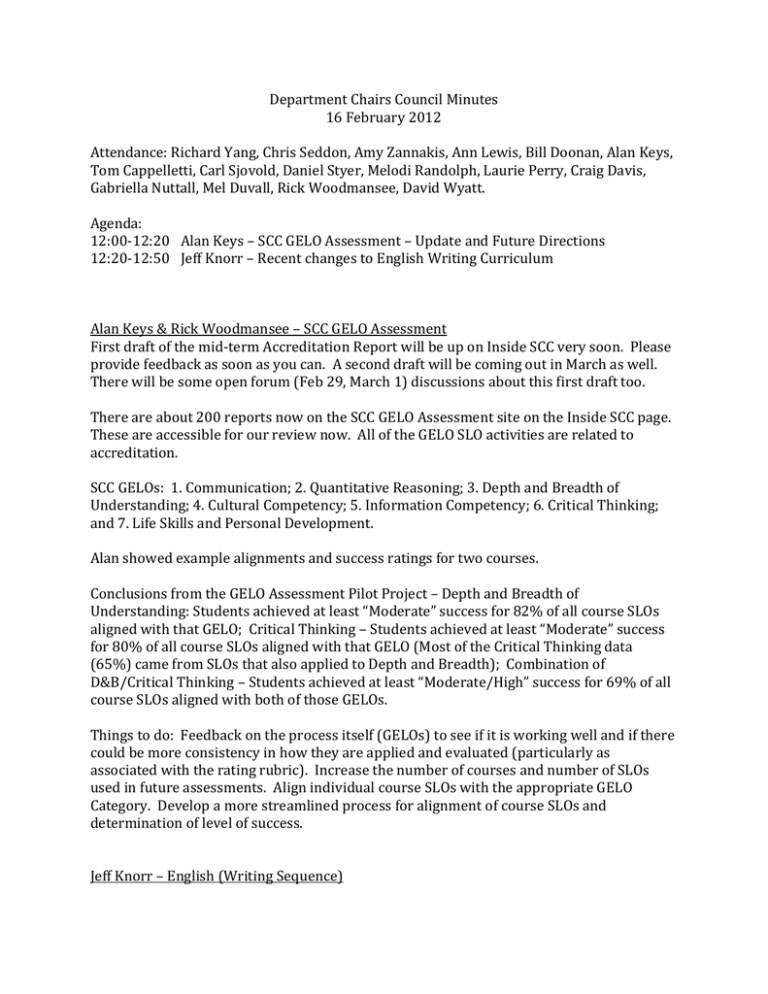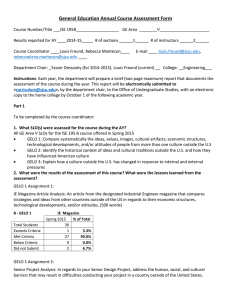Department Chairs Council Minutes 16 February 2012
advertisement

Department Chairs Council Minutes 16 February 2012 Attendance: Richard Yang, Chris Seddon, Amy Zannakis, Ann Lewis, Bill Doonan, Alan Keys, Tom Cappelletti, Carl Sjovold, Daniel Styer, Melodi Randolph, Laurie Perry, Craig Davis, Gabriella Nuttall, Mel Duvall, Rick Woodmansee, David Wyatt. Agenda: 12:00-12:20 Alan Keys – SCC GELO Assessment – Update and Future Directions 12:20-12:50 Jeff Knorr – Recent changes to English Writing Curriculum Alan Keys & Rick Woodmansee – SCC GELO Assessment First draft of the mid-term Accreditation Report will be up on Inside SCC very soon. Please provide feedback as soon as you can. A second draft will be coming out in March as well. There will be some open forum (Feb 29, March 1) discussions about this first draft too. There are about 200 reports now on the SCC GELO Assessment site on the Inside SCC page. These are accessible for our review now. All of the GELO SLO activities are related to accreditation. SCC GELOs: 1. Communication; 2. Quantitative Reasoning; 3. Depth and Breadth of Understanding; 4. Cultural Competency; 5. Information Competency; 6. Critical Thinking; and 7. Life Skills and Personal Development. Alan showed example alignments and success ratings for two courses. Conclusions from the GELO Assessment Pilot Project – Depth and Breadth of Understanding: Students achieved at least “Moderate” success for 82% of all course SLOs aligned with that GELO; Critical Thinking – Students achieved at least “Moderate” success for 80% of all course SLOs aligned with that GELO (Most of the Critical Thinking data (65%) came from SLOs that also applied to Depth and Breadth); Combination of D&B/Critical Thinking – Students achieved at least “Moderate/High” success for 69% of all course SLOs aligned with both of those GELOs. Things to do: Feedback on the process itself (GELOs) to see if it is working well and if there could be more consistency in how they are applied and evaluated (particularly as associated with the rating rubric). Increase the number of courses and number of SLOs used in future assessments. Align individual course SLOs with the appropriate GELO Category. Develop a more streamlined process for alignment of course SLOs and determination of level of success. Jeff Knorr – English (Writing Sequence) Over the years, found that English 40 and English 300 weren’t working particularly well. This led to conversations between English and other disciplines. This led to an evaluation of the prior sequence in the English Composition Curriculum. This led to a decision to “tear down” the various English Composition levels and to develop a new vision of these levels that would provide the greatest benefit to our students. Nationwide, it has been found that the lowest levels of English correspond to the least successful students. Thus the trend has been to add even lower levels to try to address issues. However, the success level continues to trend downward. Thus, SCC English looked at how to build a new and better sequence. Through this semester is the current (old) sequence: English Writing (ENGWR 40) --> Developmental Writing (ENGWR 50) --> College Writing (ENGWR 100) --> College Composition (ENGWR 300) --> College Composition and Literature (ENGWR 301) and Advanced Composition and Critical Thinking (ENGWR 302). However, there are no areas that address Research competency at the ENGWR 300 level. The new sequence gets rid of the very bottom level (ENGWR 40 and 49) and folded those FTEs into the 100 and 300 level courses. Developmental Writing (ENGWR 51), Developmental Writing Workshop (ENGWR 52), and College Writing (ENGWR 101) now implement the most recent research on acceleration at the developmental and pre-transfer levels. Thus, if ENGWR 51 is not passed the first time, then the student needs to take ENGWR 51 and ENGWR 52 simultaneously. They cannot take ENGWR 52 simultaneously with ENGWR 51 the first time around. ENGWR 52 is designed to help students that were not successful in ENGWR 51 the first time through. College Writing (ENGWR 101) will be more units than the prior ENGWR 100 and will also include a research component so that students would be proficient with research. They essentially get an introduction into evaluation formats, citations, ethical obligations in their research and writing, etc. The students will come out of 101 with research skills that are not currently done in ENGWR 100. Students would then move up into College Composition and Research (ENGWR 308) where they will have further instruction in Research Skills (Mastery of Research Skills). ENGWR 308 will have an increased focus on college-level research and will address student needs for stronger research and writing skills across disciplines. IF 308 goes through curriculum this spring, then it would be first taught (at the earliest) in Summer 2013 – and ENGWR 300 will disappear from our catalog. ENGWR 308 will be four units. Next Meeting: Thursday March 15, 2012 – Noon
![[Course information: prefix, number, title, credits] GENERAL EDUCATION COMPETENCY AREA:](http://s2.studylib.net/store/data/015759506_1-897e653fa9d8b4d146755dfb01d20713-300x300.png)
